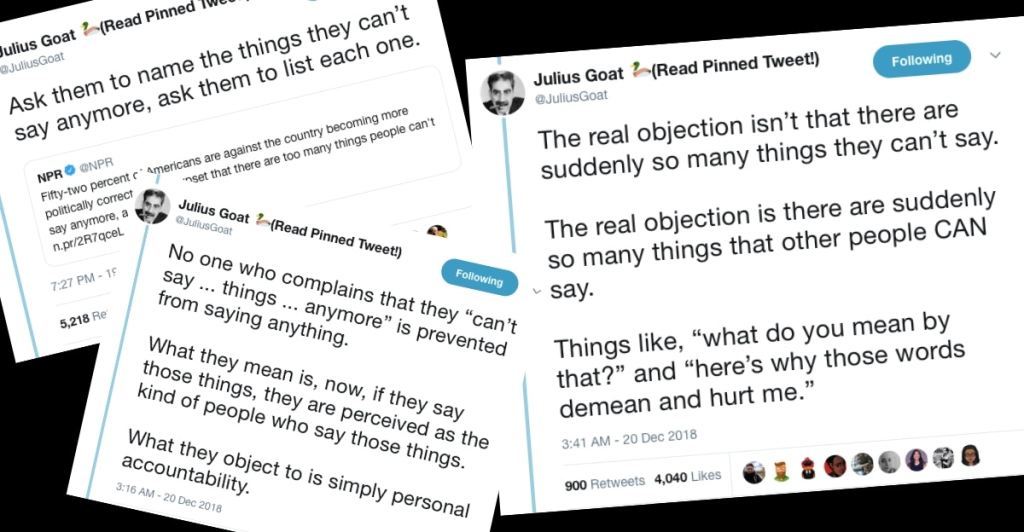When people decry “political correctness,” what are they really railing against?
Political correctness is a loaded term. People bandy it about with eye-rolling disdain whenever someone gets called out for saying offensive, sexist, racist, or otherwise hurtful things, claiming everyone is just too sensitive these days. The concept comes up more often in social than political discourse, and complaining about it seems to be the habit du jour for many.
A recent poll by NPR/PBS Newshour/Marist found that 52% of Americans are “against the country becoming more politically correct and are upset that there are too many things people can’t say anymore.” NPR shared the results in an article on Twitter with a “Warning to Democrats.”
Then Twitter user Julius Goat expertly took the posting, the poll, and the entire concept of political correctness to task in an epic thread.
If you want to know what underlies complaints about political correctness, make people say what they say they can’t say.
Julius Goat (which is the popular Twitter account of author A.R. Moxon) is known for thoughtful, hard-hitting threads that force people to think.
“Ask them to name the things they can’t say anymore,” Goat wrote in response to NPR’s tweet, “ask them to list each one.”
“Don’t allow these bullshit euphemisms,” he continued. “Make them say the things they ‘can’t’ say. They [sic] things they still say, in certain company.”
Then he pointed out an obvious—but often overlooked—truth.
“No one who complains that they ‘can’t say … things … anymore’ is prevented from saying anything,” Goat wrote. “What they mean is, now, if they say those things, they are perceived as the kind of people who say those things. What they object to is simply personal accountability.”
“The real objection isn’t that there are suddenly so many things they can’t say. The real objection is there are suddenly so many things that other people CAN say. Things like, ‘what do you mean by that?’ and ‘here’s why those words demean and hurt me.’”
Yup.
Goat continued, “‘There are things we can’t say anymore’ is a phrase intended the [sic] skirt accountability. Poll the exact things. Ask those questions. ‘What things?’ Let’s see the demographics of Americans mad they can’t say n***** any more. Or f**. And a hush fills the punditry.”
Goat also pointed out that the way such polls are conducted and analyzed add to the problem.
Asking people if they think political correctness is a problem is a different question than asking if people embrace the idea of demeaning marginalized people, but it’s basically the same idea.
“The fact that polling doesn’t ask those specific questions, but it does employ accountability-evading terms like ‘political correctness’ tells you a lot about the poll’s complicity in the dodge,” Goat wrote. “As do the articles analyzing the poll.”
“Why do we only see ‘Poll Offers Stark Warning to Democrats for Identity Politics in 2020’ and not ‘Poll Shows White People Love Slurs?’” Goad asked. “Both require the same amount of analysis. Both bring a worldview to data. Thus you can detect the worldview of seemingly neutral parties.”
Those of us who think words matter need shouldn’t fall into the trap of arguing about “political correctness” when the term itself—ironically—is so often used to evade accountability and to avoid calling a bigoted spade a bigoted spade. Who is actually being overly sensitive—the people on the receiving end of hurtful language, or the people who can’t handle being criticized for using hurtful words?
Goat’s responses to people’s predictable comments on the thread are just as spot on.
These tweets speak for themselves, and they all say BOOM.
And finally, a bit of humor that highlights the absurdity of some people’s claims about what feel they can no longer say:
Well done, Julius Goat. While some will never grasp the fact that “political correctness” is really just polite consideration that anyone in a civilized society should champion, this thread at least points out how ridiculous people’s arguments against the concept really are. It’s not that you can’t say things anymore. You just can’t say them without social consequence or criticism—which is how it should be in a society where everyone has an equal voice.



































